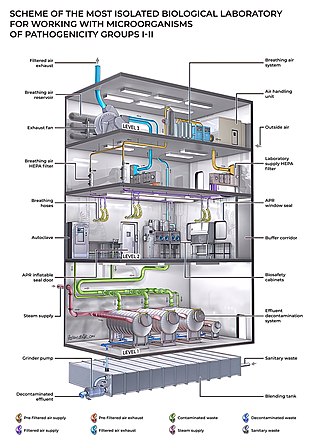Related Research Articles

A biosafety level (BSL), or pathogen/protection level, is a set of biocontainment precautions required to isolate dangerous biological agents in an enclosed laboratory facility. The levels of containment range from the lowest biosafety level 1 (BSL-1) to the highest at level 4 (BSL-4). In the United States, the Centers for Disease Control and Prevention (CDC) have specified these levels in a publication referred to as BMBL. In the European Union, the same biosafety levels are defined in a directive. In Canada the four levels are known as Containment Levels. Facilities with these designations are also sometimes given as P1 through P4, as in the term P3 laboratory.
The National Microbiology Laboratory (NML) is part of the Public Health Agency of Canada (PHAC), the agency of the Government of Canada that is responsible for public health, health emergency preparedness and response, and infectious and chronic disease control and prevention.

The State Research Center of Virology and Biotechnology VECTOR, also known as the Vector Institute, is a biological research center in Koltsovo, Novosibirsk Oblast, Russia. It has research facilities and capabilities for all levels of Biological Hazard, CDC Levels 1–4. It is one of two official repositories for the now-eradicated smallpox virus, and was part of the system of laboratories known as the Biopreparat.

The Indian Council of Medical Research (ICMR), the apex body in India for the formulation, coordination and promotion of biomedical research, is one of the oldest and largest medical research bodies in the world.
Viral culture is a laboratory technique in which samples of a virus are placed to different cell lines which the virus being tested for its ability to infect. If the cells show changes, known as cytopathic effects, then the culture is positive.
The National Tuberculosis Elimination Programme (NTEP), earlier known as the Revised National Tuberculosis Control Programme (RNTCP), is the Public Health initiative of the Government of India that organizes its anti-Tuberculosis efforts. It functions as a flagship component of the National Health Mission (NHM) and provides technical and managerial leadership to anti-tuberculosis activities in the country. As per the National Strategic Plan 2017–25, the program has a vision of achieving a "TB free India",with a strategies under the broad themes of "Prevent, Detect,Treat and Build pillars for universal coverage and social protection". The program provides, various free of cost, quality tuberculosis diagnosis and treatment services across the country through the government health system.
The National Institute of Virology in Pune, India is an Indian virology research institute and part of the Indian Council of Medical Research (ICMR). It was previously known as 'Virus Research Centre' and was founded in collaboration with the Rockefeller Foundation. It has been designated as a WHO H5 reference laboratory for SE Asia region.
In the diagnostic laboratory, virus infections can be confirmed by a myriad of methods. Diagnostic virology has changed rapidly due to the advent of molecular techniques and increased clinical sensitivity of serological assays.

Walter Ian Lipkin is the John Snow Professor of Epidemiology at the Mailman School of Public Health at Columbia University and a professor of Neurology and Pathology at the College of Physicians and Surgeons at Columbia University. He is also director of the Center for Infection and Immunity, an academic laboratory for microbe hunting in acute and chronic diseases. Lipkin is internationally recognized for his work with West Nile virus, SARS and COVID-19.
Forensic and Scientific Services (FSS) is part of Queensland Health and provides specialist scientific and medical analysis and independent expert advice in the state of Queensland, Australia. It is sometimes referred to as the John Tonge Centre.
The National Centre for Foreign Animal Disease (NCFAD), located in the Canadian Science Centre for Human and Animal Health in Winnipeg, Manitoba, is part of the Canadian Food Inspection Agency’s National Centres for Animal Disease. NCFAD is co-located with the Public Health Agency of Canada’s National Microbiology Laboratory.
Dr Lal PathLabs Limited is an Indian service provider of diagnostic and related healthcare tests. Based in New Delhi, the company offers tests on blood, urine and other human body viscera.

The Global Virus Network (GVN) is an international coalition of medical virologists whose goal is to help the international medical community by improving the detection and management of viral diseases. The network was founded in 2011 by Robert Gallo in collaboration with William Hall and Reinhard Kurth, and 24 countries were members of the network as of 2015. The GVN fosters research into viruses that cause human disease to promote the development of diagnostics, antiviral drugs and vaccines, and its mission includes strengthening scientific training and response mechanisms to viral outbreaks. The GVN has organized task forces for chikungunya, human T-lymphotropic virus, and Zika. The network is headquartered at the Institute of Human Virology at the University of Maryland School of Medicine, and Gallo serves as its scientific director.
Dr. Manmohan Parida, Sc ‘G’ assumed the charge of Director DRDE, Gwalior with effect from 1 October 2021. He obtained his graduation in Veterinary Science from Odisha Veterinary College as best graduate with three Gold Medals into his credit. He earned his master's degree in Veterinary Virology from prestigious Indian Veterinary Research Institute, Mukteswar and further obtained his Doctorate Jiwaji University, Gwalior in Microbiology. He was also awarded with Monbusho Fellowship from Japanese Govt and pursued Post Doctoral Research Scientist at Institute of Tropical Medicine, WHO reference center for research on arboviruses, Nagasaki, Japan.
The National Virus Reference Laboratory (NVRL) is located in UCD, Dublin, Ireland and is affiliated to the University College Dublin School of Medicine. The NVRL provides a diagnostic and reference service for clinicians in Ireland investigating viral infections. For over forty years, the NVRL have provided a virology diagnostic service to the Irish health service.

Christian Heinrich Maria Drosten is a German virologist whose research focus is on novel viruses (emergent viruses). During the COVID-19 pandemic, Drosten came to national prominence as an expert on the implications and actions required to combat the illness in Germany.
The National Institute of Virology (NIV) in Pakistan is a national research institute concentrating on biosafety. It has a national laboratory site dedicated to identification and eradication of Emerging infectious diseases, as well as efforts in biological warfare. The aforementioned is a BSL3 laboratory managed by the University of Karachi for the Ministry of Health. Karachi University's International Center for Chemical and Biological Sciences established the National Institute of Virology on September 19, 2019.
Alexander L. Greninger is assistant director of the UW Medicine Clinical Virology Laboratory and a UW assistant professor of Laboratory Medicine. His research is focused on genomic and proteomic characterization of a variety of human viruses and bacteria, with a focus on respiratory viruses and human herpesviruses.
Edwin Herman Lennette was an American physician, virologist, and pioneer of diagnostic virology.
References
- ↑ "Establishment of a network of Laboratories for managing epidemics and Natural Calamities (VRDL) | Department of Health Research | MoHFW | Government of India". dhr.gov.in. Retrieved 2020-01-24.
- ↑ "Establishment of a network of Laboratories for managing epidemics and Natural Calamities (VRDL) | Department of Health Research | MoHFW | Government of India". dhr.gov.in. Retrieved 2020-01-24.
- ↑ "COVID_19_Testing_Laboratories.pdf" (PDF). Archived from the original (PDF) on 2020-03-17. Retrieved 18 March 2020.
- ↑ "AIIMS Bhubaneswar to get state level virus research and diagnostics lab - Times of India". The Times of India. Retrieved 2021-03-20.
- ↑ "Viral Research and Diagnostic Laboratory Inaugurated At Cuttack's SCB". ODISHA BYTES. 2020-11-06. Retrieved 2020-11-07.